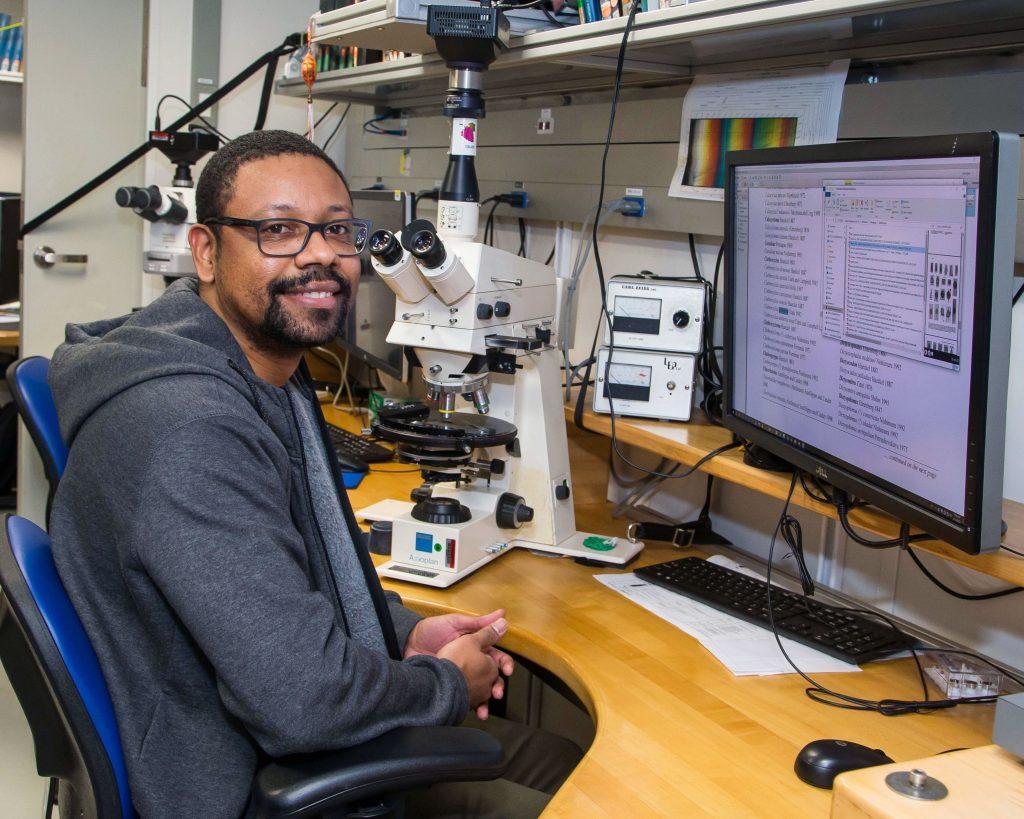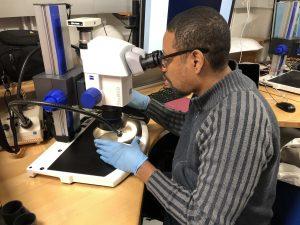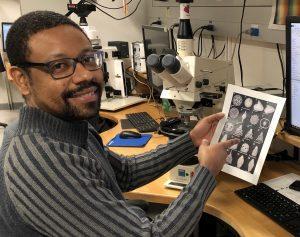
Career Spotlight: Micropaleontologist Alexandre L. de Souza

Alexandre L. de Souza Interview
Please describe your job duties while on the JR. What will you be doing on a daily basis?
-
-
-
-
-
-
-
-
- As a radiolarian paleontologist, I take samples from core catcher and then prepare them in the PaleoLab to make radiolarian slides. These slides are observed under a microscope in order to recognize important radiolarian species that will contribute toward dating the core sediments.
-
-
-
-
-
-
-
Describe one instrument or tool that is essential for you to do your job? Or a piece of equipment on the JR that is useful and why – what does it do?
-
-
-
-
-
-
-
-
- The most important instrument for my job is the microscope, as I observe microscopic fossils, without a microscope my job is impossible to do.
-
-
-
-
-
-
-
Why is your work (or research) important? What question are you trying to answer or how does your work/research help assist/advance scientific knowledge?
-
-
-
-
-
-
-
-
- I work with biostratigraphy, so I observe the species in the sediments and, from this observation, it is possible create an age model which enables us to see the history of the Earth through time, using the fossil data. My research here focuses on developing an age model for the Southern Ocean, and to observe possible changes in the radiolarian assemblage in response to fluctuations of the multiple glacial/interglacial climatic cycles.
-
-
-
-
-
-
-

Why the ocean? What made you choose a career at sea or career that involves the ocean?
- I always liked the ocean and paleontology, since I was a kid, but I changed from big dinosaur fossils to microfossils when I started working in the radiolarian biostratigraphy laboratory at the Federal University of Rio de Janeiro.
What are you most excited about for this expedition and/or being on the JR?
- To be here on-board the JR with this amazing team of scientist is a great opportunity for me to learn more about ocean science.
Optional: What are three things you think are needed for a successful expedition at sea? And Why!
- Cooperation among the scientist team, work without stress, and the support of your family.
Optional: If you could answer one question about our Earth – what would it be and why?
- How did the Earth shape life? I think that the relationships between geology and biology are key to understanding the beginning of life on the Earth.
Optional: What is your favorite sea creature and why?
- Radiolarians!! They are amazing microorganisms that surviving on Earth since more than 500 million years ago, and are able to adapt to different types of environment.

When did you know you wanted to pursue a career in science or an ocean science career?
- When I was in the final stage of my college, I started working in the radiolarian biostratigraphy laboratory, and there I discovered the possibilities of ocean science work, and that fascinated me. So, I decided that this was the kind of science I would like to do.
What do you personally hope to gain or experience while on EXP383?
- I hope gain more knowledge in paleoceanography and keep in touch with other scientists to develop future work.
What message do you have for anyone considering a career at sea or a career involving the ocean sciences?
- The oceans are important for setting the global climate, but although they cover more than 70% of the Earth’s surface, they are still poorly understood. That is why there arises the need to worry and study oceanic conditions. Don’t be afraid, be an ocean scientist!
What do you do back home when not on the JR?
- I like to do many things, but currently, I’m just only thinking about finishing my PhD.
Do you get sea sick? If yes or sometimes, please also select the other tab and describe how you cope with it.
- No – I thought I would get seasick, but my pills help me a lot!
The need for space comes in many forms. Which type of space, in general, is the most important to you?
- _X_ Personal Space
- ___ Creative Space
- ___ Outdoor Space
- ___ Emotional Space
- ___ Physical Space
- ___ Spiritual or Meditative
- ___ Outer Space
- ___ Community Space
- ___ Quite Space
- ___ Productive/Work Space
- ___ Digital/Virtual Space
- ___ Public Space
- ___ Inner Space
- ___ Other:
Why that type of space? What makes it important to you and will it be available while on the JR?
- After my shift I like to relax listening music and watching some tv series I have brought.